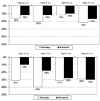Time well spent? Relating television use to children's free-time activities
- PMID: 16452327
- PMCID: PMC2862999
- DOI: 10.1542/peds.2005-0812
Time well spent? Relating television use to children's free-time activities
Abstract
Objectives: This study assessed the claim that children's television use interferes with time spent in more developmentally appropriate activities.
Methods: Data came from the first wave of the Child Development Supplement, a nationally representative sample of children aged 0 to 12 in 1997 (N = 1712). Twenty-four-hour time-use diaries from 1 randomly chosen weekday and 1 randomly chosen weekend day were used to assess children's time spent watching television, time spent with parents, time spent with siblings, time spent reading (or being read to), time spent doing homework, time spent in creative play, and time spent in active play. Ordinary least squares multiple regression was used to assess the relationship between children's television use and time spent pursuing other activities.
Results: Results indicated that time spent watching television both with and without parents or siblings was negatively related to time spent with parents or siblings, respectively, in other activities. Television viewing also was negatively related to time spent doing homework for 7- to 12-year-olds and negatively related to creative play, especially among very young children (younger than 5 years). There was no relationship between time spent watching television and time spent reading (or being read to) or to time spent in active play.
Conclusions: The results of this study are among the first to provide empirical support for the assumptions made by the American Academy of Pediatrics in their screen time recommendations. Time spent viewing television both with and without parents and siblings present was strongly negatively related to time spent interacting with parents or siblings. Television viewing was associated with decreased homework time and decreased time in creative play. Conversely, there was no support for the widespread belief that television interferes with time spent reading or in active play.
Figures
Similar articles
-
Relation of adolescent video game play to time spent in other activities.Arch Pediatr Adolesc Med. 2007 Jul;161(7):684-9. doi: 10.1001/archpedi.161.7.684. Arch Pediatr Adolesc Med. 2007. PMID: 17606832 Free PMC article.
-
Reducing children's television-viewing time: a qualitative study of parents and their children.Pediatrics. 2006 Nov;118(5):e1303-10. doi: 10.1542/peds.2006-0732. Pediatrics. 2006. PMID: 17079531
-
Canadian children's and youth's pedometer-determined steps/day, parent-reported TV watching time, and overweight/obesity: the CANPLAY Surveillance Study.Int J Behav Nutr Phys Act. 2011 Jun 25;8:66. doi: 10.1186/1479-5868-8-66. Int J Behav Nutr Phys Act. 2011. PMID: 21702982 Free PMC article.
-
Is television viewing associated with social isolation? Roles of exposure time, viewing context, and violent content.Arch Pediatr Adolesc Med. 2006 Apr;160(4):387-92. doi: 10.1001/archpedi.160.4.387. Arch Pediatr Adolesc Med. 2006. PMID: 16585484
-
Influencing factors of screen time in preschool children: an exploration of parents' perceptions through focus groups in six European countries.Obes Rev. 2012 Mar;13 Suppl 1:75-84. doi: 10.1111/j.1467-789X.2011.00961.x. Obes Rev. 2012. PMID: 22309066 Review.
Cited by
-
A Preliminary Evaluation of a School-Based Media Education and Reduction Intervention.J Prim Prev. 2018 Jun;39(3):229-245. doi: 10.1007/s10935-018-0510-2. J Prim Prev. 2018. PMID: 29721652
-
Daily Time-Use Patterns and Obesity and Mental Health among Primary School Students in Shanghai: A Population-Based Cross-Sectional Study.Sci Rep. 2017 Nov 23;7(1):16200. doi: 10.1038/s41598-017-15102-4. Sci Rep. 2017. PMID: 29170506 Free PMC article.
-
Norms and trends of sleep time among US children and adolescents.JAMA Pediatr. 2013 Jan;167(1):55-60. doi: 10.1001/jamapediatrics.2013.423. JAMA Pediatr. 2013. PMID: 23403646 Free PMC article.
-
Modifying media content for preschool children: a randomized controlled trial.Pediatrics. 2013 Mar;131(3):431-8. doi: 10.1542/peds.2012-1493. Epub 2013 Feb 18. Pediatrics. 2013. PMID: 23420911 Free PMC article. Clinical Trial.
-
Media and mental health.Ind Psychiatry J. 2018 Jan-Jun;27(1):1-5. doi: 10.4103/ipj.ipj_73_18. Ind Psychiatry J. 2018. PMID: 30416284 Free PMC article. No abstract available.
References
-
- Mutz DC, Roberts DF, van Vuuren DP. Reconsidering the displacement hypothesis: television’s influence on children’s time use. Commun Res. 1993;20:51–75.
-
- American Academy of Pediatrics Committee on Public Education. Media education. Pediatrics. 1999;104:341–343. - PubMed
-
- Kaiser Family Foundation. Kids and Media@The New Millennium. Menlo Park, CA: Kaiser Family Foundation; 1999.
-
- Wright JC, Huston AC, Vandewater EA, et al. American children’s use of electronic media in 1997: A national survey. J Appl Dev Psychol. 2001;22:31–47.
-
- Kaiser Family Foundation. Zero to Six: Electronic Media in the Lives of Infants, Toddlers and Preschoolers. Menlo Park, CA: Kaiser Family Foundation; 2004.
Publication types
MeSH terms
Grants and funding
LinkOut - more resources
Full Text Sources


